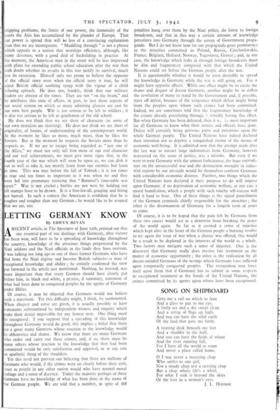ET TIN G GERMANY KNOW
By EDIVVN BEVAN
RECENT article, in The Spectator of June 12th, pointed out that
one essential part of our dealings with Germany, after victory as been won, will have to be a spreading of knowledge throughout e country, knowledge of the atrocious things perpetrated by the azi soldiers and the Nazi officials in the lands they have overrun. was talking not long ago to one of those former Germans who have ed from the Nazi regime and become British subjects—a man of xceptional knowledge and ability ; he entirely confirmed the view ut forward in the article just mentioned. Nothing, he insisted, was ore important than that every German should have clearly put fore him, in black and white, a precise, if summary, statement of hat had been done to conquered peoples by the agents of Germany nder Hitler.
Of course, it may be objected that Germans would not believe uch a statement. Yet this difficulty might, I think, be surmounted. Vhen chapter and verse are given, it is usually possible to have tatements substantiated by independent witness and enquiry which ake their denial impossible for any honest man. One thing must e recognised: if you suppose that a spreading of this knowledge hroughout Germany would do good, this implies a belief that there re a great many Germans whose reaction to the knowledge would e abhorrence and shame. We know that there are many Germans ho order and carry out these crimes, and, if so, there must be any others whose reaction to the knowledge that they had been ommitted would be satisfaction and approval, or at any rate n apathetic shrug of the shoulders.
Yet this need not prevent our believing that there are millions of ermans who would, if the crimes were set clearly before their eyes, react as people in any other nation would who have normal moral eelings and a sense of decency. Today the majority perhaps of these ermans have no knowledge of what has been done in the name of he German people. We are told that a number, in spite of the penalties hung .over them by the Nazi police, do listen to foreign broadcasts, and that in this way a certain amount of knowledge percolates into Germany through the screen of Government propa- ganda. But I do not know how far our propaganda gives prominence to the atrocities committed in Poland, Russia, Czechoslovakia, France, Belgium, Holland, Norway, Yugoslavia, Greece ; and, in any case, the knowledge which leaks in through foreign broadcasts must be dim and fragmentary compared with that which the United Nations could set before the German people after the war.
It is questionable whether it would be even desirable to spread the knowledge in Germany .while the war is still going on. For it might have opposite effects. While one effect might be to excite the shame and disgust of decent Germans, another might be to stiffen the resolution of many to stand by the Government and, if possible, stave off defeat, because of the vengeance which defeat might bring from the peoples upon whom such crimes had been committed. Indeed, we are sometimes told that the fragmentary knowledge of the crimes already percolating through lo actually having this effect.
But when Germany has been defeated, then it Lc most important for all Germans to know what their armies and oflicials have done. Defeat will certainly bring grievous pains and privations upon the whole German people. The United Nations have indeed declared their intention not to deprive a vanquished enemy of the means of economic well-being. It is admitted now that the attempt made after the last war to extract large indemnities from Germany, however warranted on the score of justice, was a mistake. But even if we were to treat Germany with the utmost forbearance, the huge expendi- ture on the unsuccessful war and the destruction wrought in indus- trial regions by our air-raids would by themselves confront Germany with considerable economic distress. Further, two things which the United Nations have declared it their purpose to do will impose upon Germany, if no deprivation of economic welfare, at any rate a moral humiliation, which a people with such touchy self-esteem will find it hard to bear. One of these things is the signal punishment of the German criminals chiefly responsible for the atrocities ; the other is the disarmament of Germany for a longish term of years to come.
Of course, it is to be hoped that the pain felt by Germans from these two causes would act as a deterrent from breaking the peace of the world again. So far as it created a sense of injustice which kept alive in the heart of the German people a burning resolve to try again the issue of war when a chance was offered, this would be a result to be deplored in the interests of the world as a whole. Two factors may mitigate such a sense of injustice. One is the discovery that Germany really does receive fair treatment in the matter of economic opportunity ; the other is the realisation by all decent-minded Germans of the wrongs which Germans have inflicted upon temporarily conquered peoples. The recognition may force itself upon them that if Germany has to submit in some respects to exceptional treatment at the hands of the United Nations, the crimes committed by its agents upon others have been exceptional.


























 Previous page
Previous page